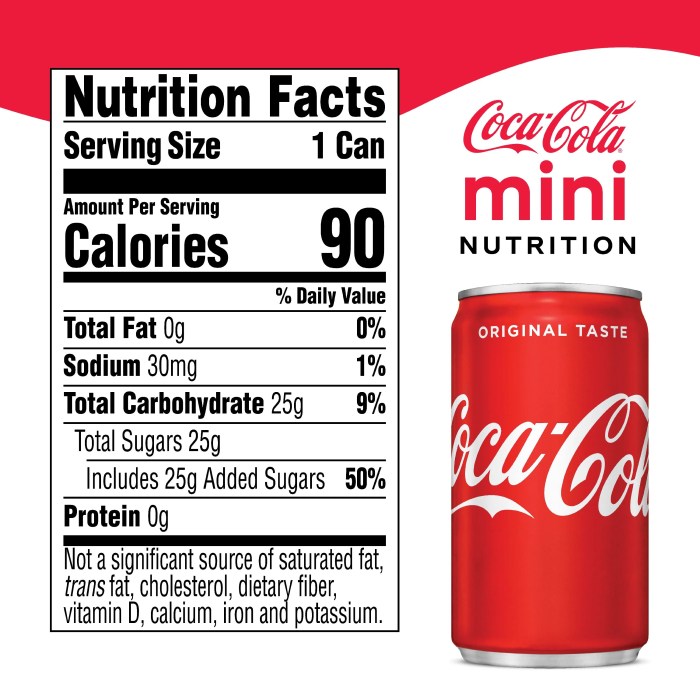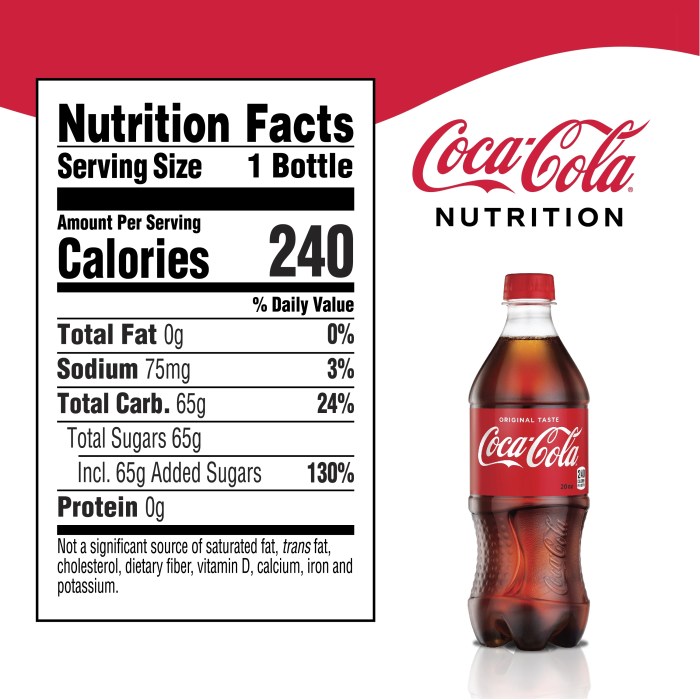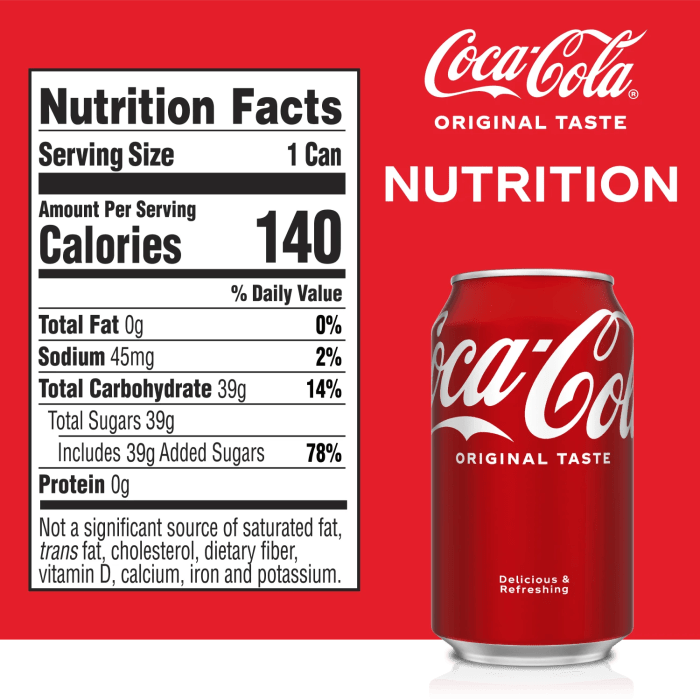Nutritional Content Breakdown

12 oz coca cola nutrition facts – Right, so, let’s get down to brass tacks and dissect the nutritional content of a 12oz can of Coca-Cola. It’s a bit of a beast, this one, nutritionally speaking, so buckle up. We’ll be looking at the calories, sugars, carbs, and other bits and bobs that make up this iconic beverage.
Nutritional Components of Coca-Cola
Here’s the lowdown on what you’re actually guzzling when you crack open a can. This data is based on average values and might vary slightly depending on the batch. It’s all a bit of a chemical cocktail, really.
Understanding the nutritional profile of a 12 oz Coca-Cola is crucial for mindful consumption. Comparing it to other beverages, such as checking the details on modelo nutrition facts 12 oz , provides a broader perspective on sugar content and caloric intake. Returning to the Coca-Cola, remember to always check the label for the most up-to-date information to make informed choices.
| Nutrient | Amount per Serving | % Daily Value | Unit of Measurement |
|---|---|---|---|
| Calories | 140 | ~7% | kcal |
| Total Carbohydrate | 39g | ~13% | g |
| Sugars | 39g | ~43% | g |
| Sodium | 0mg | 0% | mg |
| Potassium | 1mg | 0% | mg |
| Protein | 0g | 0% | g |
| Fat | 0g | 0% | g |
The source of the calories and carbohydrates primarily comes from the high sugar content. Coca-Cola’s recipe is famously secretive, but it essentially boils down to carbonated water, high fructose corn syrup (or sugar, depending on the region), caramel color, phosphoric acid, caffeine, and natural flavors. The sugars contribute almost entirely to the carbohydrate content, while the phosphoric acid contributes to the tartness.
The caffeine, of course, provides that little kick.
Comparison with Other Carbonated Soft Drinks
Right, so how does Coke stack up against its rivals? It’s a pretty typical fizzy drink in terms of its nutritional profile. Other popular sodas like Pepsi, Sprite, and 7 Up generally have similar calorie and sugar contents, although the exact amounts may differ slightly due to variations in their recipes. These differences are often down to the type of sweetener used and the precise formulation of flavourings.
Essentially, they’re all pretty much in the same ballpark – a bit of a sugar rush in a can. Choosing one over the other is largely a matter of personal preference, not a massive nutritional win either way.
Sugar Content and Health Implications

Right, so let’s get down to the nitty-gritty about that sugar rush in your average 12oz Coca-Cola. We’re talking about the impact on your bod, not just the initial sugary buzz. It’s a bit of a minefield, really, so let’s navigate it together.The high sugar content in Coca-Cola, and sugary drinks in general, is a bit of a game-changer for your overall health.
We’re not just talking about a bit of extra weight; we’re looking at some serious long-term consequences. Think type 2 diabetes, a real banger of a condition, and dental woes – cavities, anyone? It’s all linked to that excessive sugar intake. The sheer amount of added sugar is a major contributor to weight gain, leading to obesity and a whole host of other health problems.
Basically, it’s a recipe for disaster if you’re not careful.
Sugar Content and Weight Gain
Excessive sugar consumption contributes significantly to weight gain. The calories from sugar are empty calories – they provide energy but lack essential nutrients. Your body stores this excess energy as fat, leading to weight gain and, potentially, obesity. This can then snowball into other issues like heart disease and high blood pressure. Think of it like this: a 12oz Coke packs a serious sugary punch, and consistently consuming these drinks adds up to a significant calorie surplus over time.
Sugar Content and Type 2 Diabetes
Regular consumption of sugary drinks like Coca-Cola significantly increases the risk of developing type 2 diabetes. The high sugar content overwhelms the body’s ability to regulate blood glucose levels, leading to insulin resistance. Over time, this can result in chronically high blood sugar, a hallmark of type 2 diabetes. The consequences can be pretty grim, ranging from nerve damage to kidney problems.
It’s a proper health crisis waiting to happen if you’re not mindful of your sugar intake.
Sugar Content and Tooth Decay
Sugary drinks are a nightmare for your teeth. The sugar feeds the bacteria in your mouth, producing acids that erode tooth enamel. This leads to cavities and other dental problems. Coca-Cola’s acidity exacerbates this issue, further damaging the enamel. Regular brushing and flossing are essential, but reducing your intake of sugary drinks is crucial for maintaining good oral hygiene.
Recommendations for Reducing Sugar Intake
Cutting down on sugary drinks is a game-changer. Swapping your Coke for water, unsweetened tea, or sparkling water is a brilliant start. You could also try diluting fruit juices, as they’re often packed with sugar. Gradually reducing your intake will help you adapt to a less sugary lifestyle without feeling completely deprived. It’s about making small, manageable changes that add up over time.
Sugar Content Comparison, 12 oz coca cola nutrition facts
| Beverage | Serving Size (oz) | Sugar Content (grams) | Approximate Sugar Content (teaspoons) |
|---|---|---|---|
| Coca-Cola (12 oz) | 12 | 39 | 9.75 |
| Orange Juice (12 oz) | 12 | 21-29 | 5.25-7.25 |
| Apple Juice (12 oz) | 12 | 36 | 9 |
| Water (12 oz) | 12 | 0 | 0 |
Alternative Beverage Options: 12 Oz Coca Cola Nutrition Facts

Right, so we’ve dissected the nutritional nasties in Coca-Cola. Time to look at some swanky alternatives that won’t leave you feeling like you’ve swallowed a sugar bomb. These options offer a refreshing change without the hefty price tag on your waistline.Choosing a healthier drink is all about ditching the added sugar and boosting your intake of beneficial nutrients.
Let’s explore some top contenders that are both delicious and good for you.
Healthier Beverage Alternatives
A range of beverages offer a significantly improved nutritional profile compared to Coca-Cola. These alternatives generally boast lower sugar content, fewer empty calories, and often include added vitamins or minerals.
- Water: Plain old H 2O. The ultimate hydration hero, completely calorie and sugar-free. It’s the gold standard for healthy hydration, crucial for bodily functions.
- Unsweetened Tea: Black, green, or herbal teas provide antioxidants and are naturally caffeine-free (unless you go for black tea, obviously). They’re super low in calories and sugar, providing a refreshing alternative. Remember, adding sugar negates the health benefits, so keep it unsweetened!
- Sparkling Water: Adds a bit of fizz to your hydration routine without the sugar crash. Look for brands with no added sugars or artificial sweeteners. Flavoured versions are available, but check the sugar content.
- Diluted Fruit Juice: Fruit juice contains vitamins and minerals, but it’s also high in natural sugars. Diluting it with water significantly reduces the sugar intake while retaining some of the nutritional benefits. Aim for a ratio of at least 1 part juice to 3 parts water.
- Low-Sugar or Sugar-Free Soft Drinks: While not ideal, these options are a less sugary alternative to regular soda. However, always check the ingredients for artificial sweeteners and their potential long-term health implications.
Nutritional Comparison: Visual Representation
Imagine a bar chart. On the left, we have Coca-Cola, represented by a massive, towering bar signifying its high sugar and calorie content. A tiny sliver at the bottom represents its minimal nutritional value.Now, let’s look at the other bars. Water has a near-invisible bar for sugar and calories, but a tall bar for hydration. Unsweetened tea has a slightly taller bar than water for antioxidants, but still very low for sugar and calories.
Diluted fruit juice shows a modest increase in sugar and calories compared to water and tea, but a noticeable rise in vitamins and minerals. Low-sugar soda sits somewhere in between Coca-Cola and the healthier options, with a significantly reduced but still present sugar and calorie bar.This visual representation clearly demonstrates the stark contrast in nutritional profiles. The healthier options provide essential nutrients with minimal empty calories and sugar, unlike Coca-Cola, which is predominantly sugar and calories.
Essential Questionnaire
What are the long-term effects of consuming artificial sweeteners found in some Coca-Cola alternatives?
Research on the long-term effects of artificial sweeteners is ongoing and inconclusive. Some studies suggest potential links to metabolic issues, while others show no significant harm. It’s crucial to consult with a healthcare professional for personalized advice.
How does Coca-Cola’s caffeine content affect the body?
Caffeine is a stimulant that can increase alertness, energy levels, and heart rate. Moderate consumption is generally considered safe, but excessive intake can lead to anxiety, insomnia, and other adverse effects. Listen to your body and adjust your intake accordingly.
Are there any spiritual practices that complement healthy eating habits?
Mindfulness practices, such as mindful eating, can enhance our connection to our bodies and our food. Gratitude for nourishment and mindful preparation of meals can deepen our appreciation for the sustenance that supports our physical and spiritual well-being.


